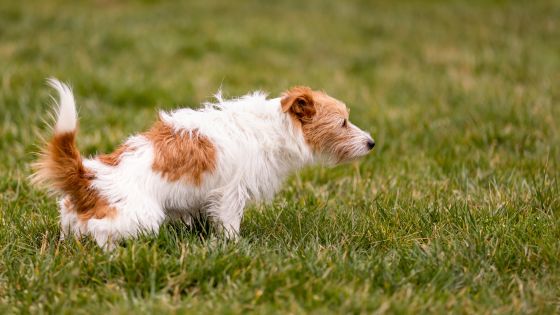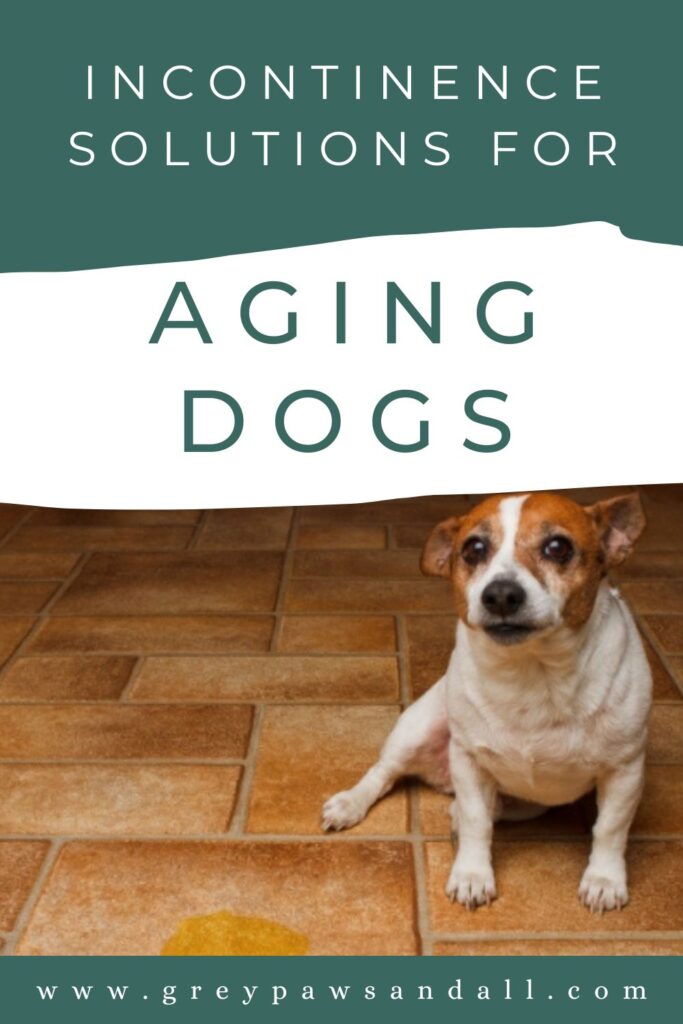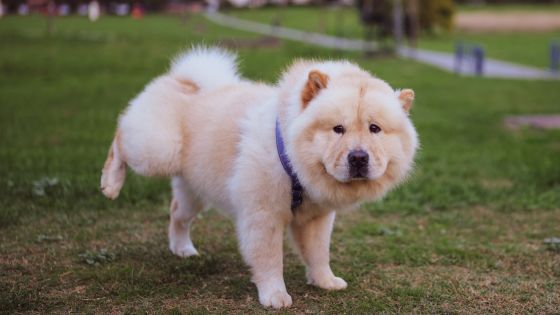As senior dog parents, incontinence is a word we hear a lot, even if our dog hasn’t been affected by it. I’ve never had an old dog that was incontinent, but I believe it’s important to familiarise ourselves with a variety of issues common in senior dogs.
I don’t want this to be something else you will worry about, just something to be mindful of. At least having an idea of what the signs are, means you can potentially catch it in its early stages.
From drugs like Proin and Incurin to doggie diapers and pee pads, there are lots you can do to help your incontinent dog.
There are affiliate links in this post, which means if you make a purchase I may receive a tiny commission. This has no effect on the price you pay.
What is Incontinence?
Simply put, it’s when a dog involuntarily loses bladder control. Your dog is not doing this on purpose, being spiteful, acting out or even aware it’s happening.
It’s very common for incontinent dogs to leak urine when sleeping or relaxing.
NOTE: Never limit your dog’s access to water. I imagine it seems like the logical thing to do. Your dog is peeing a lot…and not only outside, so less water means less pee! Nope, it doesn’t, and in fact it can be dangerous.
Signs Your Senior Dog May Be Incontinent
- The fur on his legs is wet
- Smell of urine on him, where he sleeps/spends a lot of time
- Excessive licking around the back end
- Sudden accidents in the house
- Dribbling urine when walking or after peeing
- Scalding on the skin from constant contact with urine
- Squatting without peeing much
- Puddles/drops of urine where he or she sleeps
- Wet bed
- Restless or anxious, signalling possible discomfort

Causes of Canine Incontinence
♦ According to VetsNow (veterinary emergency and critical care service) and the PDSA, USMI (urethral sphincter mechanism incompetence is the most common cause of urinary incompetence in female dogs. It’s a weakening of the bladder neck, so urine can’t be contained in the bladder. “It’s also related to the position of the neck of the bladder in the dog’s pelvis. Changes in internal pressure when the dog lies down mean that the urine can easily flow into the neck of the bladder and then will start to leak out.”
♦ Steroids – cause your dog to drink a lot and therefore pee a lot
♦ Spinal problems such as disc disease and degenerative myelopathy
♦ Cognitive issues such as dementia
♦ Urinary tract infections (UTIs), bladder tumors/stones/infection
♦ Kidney disease, Cushing’s, Diabetes
♦ Anatomic abnormalities (congenital defect…)
♦ Stress, fear, anxiety, changes in living situation
Diagnosing Incontinence in Dogs
Observations/experience of the pet parent
Before your vet examines your dog, he or she will ask you about what’s been going on. Making notes ahead of time will ensure you don’t forget anything.
- What you’ve noticed
- When it started
- Does it look like your dog is actually peeing in the house, or is it puddles or drops
- Is your dog drinking more
- When your dog pees does it seem painful or a struggle
- Any other changes in behavior you’ve been noticing
- Did something new/different happen around the time this started
Testing
Your vet will want to do urine and most likely blood tests to start.
There are other tests that can be done, but he will likely wait until these two results come back. Once that happens, he may recommend further testing to help with a diagnosis. Some may sound scary but don’t worry, and please don’t start thinking worst case scenario. These are just options he has should the tests not be conclusive, or require further investigation.
- X rays
- Ultrasound
- Neurological exam
- Catheter to check for obstruction or abnormality
- Neurological exam which would test for feeling around the back end and spinal reflexes if it’s suspected it’s caused by a neurological disorder
- Catheter to check for obstruction or an abnormality
- Cystoscopy (a camera into the bladder)
Helpful tip – Call your vet’s office and ask if you can drop off a urine sample before your visit. They can check it in house, and if more in depth testing is needed, results should be back from the lab before your appointment. That at least will give him a good starting point. Ask them their protocol for urine collection. My vet said first pee of the day mid-stream, dropped off within 2 hours.
If you’ve never taken a urine sample before, the video below will show you how. For a girl dog, just put the container under her when she starts to squat! I used a shallow plastic bowl, then a syringe (no needle!) to suction up the pee and transfer it to a pot from the vet. If you don’t have one, any new small container with a secure lid will do.
Treating an Incontinent Dog
Once your vet has received all the tests and a diagnosis made, he will put together a treatment plan.
Three medications available on prescription are Proin (for male and female dogs), Incurin (for urinary incontinence in female dogs) and Propalin. There may be more, but I’m not a vet so I’ve listed the ones I’ve heard about from senior dog parents.
Senior dog parent recommendations
Note: Even though senior dog parents have used the products below and found them helpful, do not give anything new to your dog without first checking with your vet.
♦ Hold It – bladder function supplement
♦ HomeoPet Leaks No More
♦ NaturVet Senior Advanced Incontinence
♦ Vetri-Science Bladder Strength
♦ Corn silk – used for bladder infections, inflammation of the urinary system, inflammation of the prostate and kidney stones
♦ Pet Honesty Cranberry Supplements
♦ Herbsmith Bladder Care
Other Ways to Help Your Incontinent Dog
In addition to the products listed above, here are some other ways to help your dog…and you!
Pee pads
Whether your dog is blind and won’t be able to find the pee pads on her own, or there’s no way to train your dog to use them, they are amazing!!
My dog Red wasn’t incontinent, but she was peeing in the house at times because of dementia. Since she was blind and couldn’t show her a pee pad or two, I covered the entire floor. Not an attractive look, but effective.
You may be able to just cover a smaller area, or if you keep your dog contained in an exercise pen (for example) when you’re not around, put the pads there.
Keep your dog clean and dry
Doggie wipes will help keep the area clean and dry. You want to avoid your dog getting scalding on the skin from sitting in urine.
Frequent pee breaks
In between walks, be sure to take your dog out for quick pee breaks. Hopefully that will cut down how often he pees in the house and lies in it.
Washable dog bed covers
Covers that are easy to remove and easy to wash will help.
I saw plenty of beds advertised as being for incontinent dogs, and contain fabric that wicks away moisture to keep them dry. I have no experience with this type of bed, nor have any of my FB group members ever mentioned it. I recommend researching and reading reviews, to see if this is something you’d like to try.
Diapers and belly bands
A very popular option, they go a long way to stopping your dog from peeing/dribbling on his bed and your floor.
Note: Don’t let your dog sit in a wet diaper too long, as the urine will burn his skin.
I wrote an article about this topic, including how to get your dog used to wearing them and favorite brands. Read it here – “The Essential Guide to Diapers for Your Old Dog”

What Senior Dog Parents Had to Say
Below are some comments from pet parents of incontinent dogs.
“Our 12 year old started Proin a month ago and has not had a single accident since. It’s worth looking into!”
“Belly bands are a blessing! You can either use disposable, or reusable. I recommend reusable and place a sanitary napkin inside for extra absorbancy. Good luck!”
“A dear friend in Australia told me about Corn silk capsules, believe me they work. She uses them on her two older dogs, male and female, and it has helped.”
“My dog was on Propalin and it didn’t work on its own, a second vet added Incurin ( so she takes both), she has been dry since March 2020 it worked almost instantly 😊”
“I switched to Vetri-Science Bladder Strength, an herbal product and it has worked well for all 3 dogs. Initially for all 3, I only had to give a half dose as well.”
“We had good luck with a homeopathic product for incontinence. Homeopet makes Leaks No More. Once we got the dose perfect, she did not leak anymore.”
“My Izzy is on Proin and has been for 4 years without any issues. It started with a wet spot on my bed in the morning. Not a large one but enough for me to be concerned especially when it kept happening. My vet indicated that when some dogs get older the muscles don’t work as well and they “leak” while relaxed.”
“Proin (adding estrodiol if needed) was a godsend for my girl and me. My only regret was not starting it sooner! It was a big quality of life increase for both of us. Good luck!”
“I have used Leaks no More and it does work, my 14 year old has a leaky bladder. It took a month to work because hers is so severe but eventually did.”
“Fancy leaked often when we got her at 15 along with chronic UTIs. I have her on 2 cranberry supplements (Pet Honesty and Herbsmith) as well as a bladder supplement from Vetriscience with no cranberry. This combination seems to work well. She wears diapers at night and I store them in a diaper pail, wash them by soaking first, then washing every 4 days. Hang to dry, no dryer. No UTI for almost a year!!!”
“I hated the cloth belly bands. I just bought the belly band disposal ones because the cloth ones where not absorbent at all, and he was wet all the time and started to smell awful cause he was sitting in the wet diapers. Disposable ones were the best. I regretted buying the cloth ones.”
“Phenylpropanolamine (Proin) has been a huge help for my Pom when he started having accidents in the night. I had diapers for him too, but he hated them and got upset every night. We started with the meds twice a day for a couple weeks, and now he only gets one a day. No accidents in over a month! (And I should add we did the exam and urinalysis to make sure it wasn’t a regular UTI.)”
Resources
Incontinence in Dogs: Why Does My Housetrained Dog Pee Indoors?
Older Dog Incontinence at Night, Why is My Dog Peeing Inside?
The Essential Guide to Diapers for Your Old Dog
I am a Senior Dog Care Consultant, helping senior dog parents struggling with anticipatory grief and quality of life issues, by offering practical tips, advice and one on one support. I am also a Certified Pet Loss Bereavement Specialist, helping you navigate through your pet loss journey.
Click this link to book a FREE 20 minute discovery call, visit my services page to find out more or email hindy@greypawsandall.com if you have any questions.
I’ve been rescuing and caring for senior dogs since 2009. From vision and hearing loss to obesity, dementia, kidney disease, liver issues, cardiac problems, Cushing’s, mobility challenges and more, you could say I’ve dealt with and learned a lot! In addition to my hands on experience, I’ve taken many courses and earned several qualifications to keep learning how to help senior dogs and they include: Senior Dog Enrichment, Understanding Canine Anxiety, Care of the Senior Pet and I’m a Certified Pet Loss Specialist.

